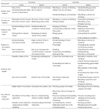Abstract
This study was conducted to reduce sodium (Na) intake and to establish healthy dietary lifestyles of children. To achieve these goals, we searched, collected, and analyzed the materials related to the Na education, based on which the research personnel-professors and graduate students in nutrition and child education and elementary school teachers discussed to figure out major topics, objectives, and detailed contents and activities appropriate for Na intake reduction. Also a survey was done on the sodium intake and nutrition knowledge of the elementary students. We also organized an advisory committee composed of 15 professionals in related fields to discuss the adequacy and validity of the specific contents. Finally, we systematically organized the contents and developed children's textbooks and teacher's guidebooks. Considering the different cognitive development stages of junior and senior elementary students, we developed two different textbooks for each of them which are easy to read and understand, fun to play with lots of activities, and designed to practice into daily life. The contents cover three major topics-the concept of Na, Na in food, Na in life and are composed of 6 units in total. To help teachers understand and instruct, teacher's guidebook contains an overview of the education, specific information and practical guidelines for each class. We developed these education materials with the aim of lowering children's Na consumption and eventually promoting their health welfare; hopefully we expect these materials would be useful for children's nutritional education in the field.
Figures and Tables
Fig. 1
The cover and representative pages of junior elementary students' textbook for the education to reduce Na intake.

Fig. 2
The cover and representative pages of senior elementary students' textbook for the education to reduce Na intake.

Fig. 3
The representative pages of teaching manual for the education of senior elementary students' textbook to reduce Na intake.

Table 1
Selected topics for the education to reduce natrium intake of the elementary school students

References
1. The Korean Nutrition Society. Dietary References Intakes for Koreans. 2005.
2. Son SM, Huh GY. Dietary Risk Factors Associated with Hypertension in Patients. Korean J Community Nutr. 2006. 11(5):661–672.
3. Ministery of Health, Welfare and Family Affairs (MHWFA). 2005 Korean National Health and Nutritional Examination Survey. 2006.
4. Ministery of Health, Welfare and Family Affairs (MHWFA). 2007 Korean National Health and Nutritional Examination Survey. 2008.
5. Song YJ, Joung HJ, Kim YN, Paik HY. The Physical Development and Dietary Intakes for Korean Children and Adolescents: Food and Nutrition Intake (II). Korean J Nutr. 2006. 39(1):50–57.
6. KNS. Events of Nutrition day, Proper Nutrition for a Healthy Tomorrow. 2007.
7. Ministery of Health, Welfare and Family Affairs (MHWFA). The Plan for Low Salt Intake Project of Korean people. 2005.
8. Lim HJ. A Study on the Food Intake, Sodium and Potassium Intakes and Urinary Excretion of Preschool Children in Pusan. Korean J Nutr. 2000. 33(6):647–659.
9. Kim JY, Kang YR, Lee MY, Paik HY. Sodium Intake and Preference for Salty Elementary School Children Residing in Rural and Urban Areas of Korea. Korean J Nutr. 1990. 23(4):48–256.
10. Kim EK, Man HW, Park YS, Myung CO, Lee LW. Nutrition Across the Life Span. 2007. Shinkwang Publishing Co.
11. Lee SS. A Study on Dietary Behavior of Children According to the Their Preference for Fast Food. Korean J Community Nutr. 2004. 9(2):204–213.
12. www.saltdown.com.
13. Lee NH, Kim KH, Park YM, Chol JN. Case of Education 'Low Salt Intake' by written Message to Home for children's Parents in Nursing Facilities. Annual Symposium of Dietetics. 2007. 325.
14. Ministery of Health, Welfare and Family Affairs (MHWFA). 2003 Dietary Goals and Dietary Guidelines for Korean Children. 2003.
15. Ministry of Education and Human Resources Development. Textbook of Science 3-1. 2006.
16. Ministry of Education and Human Resources Development. Textbook of Korean Language 4-1. 2006.
17. Ministry of Education and Human Resources Development. Textbook of Science 5-1. 2006.
22. Lee YM, Lee MJ, Kim SY. Effects of Nutrition through Discretional Activities in Elementary School. J Korean Dietetic Assoc. 2005. 11(3):331–340.
23. Son SM, Lee KH, Kim KW, Lee YK. Nutrition Education and Nutrition Counseling in the Act 2nd ed. 2009. Life Science Publishing Co.
24. Moon HK, Park Y, Park JH. Evaluation of a Nutrition Education Program for 5th Grade Students Provided by Community Health Centers in the Seoul Metropolitan Area. J Korean Dietetic Assoc. 2008. 14(3):259–275.
25. Kim CI, Park YS, Lee JW, Hyun WJ. School Dietitians Need Useful Nutrition Counseling Materials. J Korean Dietetic Assoc. 2006. 12(3):243–253.
26. Her ES, Yang HL, Yoon HS, Lee KH. Nutritional Education Status and Recognition of the Importance of Elementary School Dietitians in the Gyeongnam Area. Korean J Community Nutr. 2002. 7(6):781–793.
27. Evers CL. How to teach nutrition to kids; A Integrated, creative approach to nutrition for children. 1995. Tigard: 24 Carrots Press.
28. Kyeon YK, Jang YA, Kim JW. Application of a Practical Nutrition Education Program, KHIDIKIDS, for the Improvement of Dietary Attitudes and Habits of Elementary Students. Koeran J Nutr. 2006. 39(8):808–816.
29. Lee KH, Her ES, Woo TJ. Development of Nutrition Education Textbook and Teaching Manual in Elementary School. J Korean Dietetic Assoc. 2005. 11(2):205–215.
30. Kim HJM, Ryu SH, Lee SY. Development and effects of Nutrition program on discretional activity class in the Elementary Schools. J Korean Prac Arts Educ. 2004. 17(2):109–125.




 PDF
PDF ePub
ePub Citation
Citation Print
Print




 XML Download
XML Download